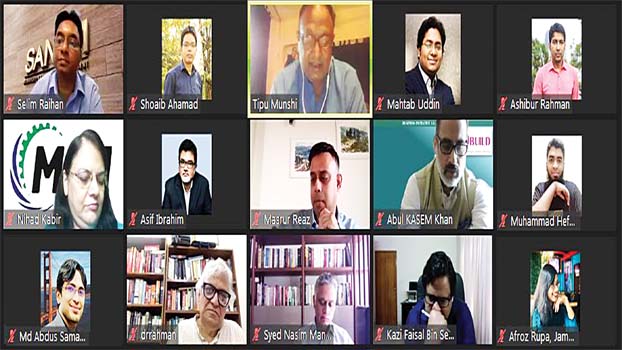Effective implementation of stimulus package is critically important: Experts

Business Desk
“Effective implementation of the stimulus the package is critically important, Dr. Raihan pointed out. Among the respondents, 34 percent of the firms availed assistance from stimulus package while 55 percent did not do so and 11 percent did not know about the stimulus package”, speakers said at a werbinar on Saturday.
Referring to a survey report, released in the webinar said, in identifying the reasons for not availing the stimulus package the survey found that among those who did not avail the stimulus package, 84 percent said that there was no stimulus package for their industry, 82 percent said that the incentive package was not a grant, 80 percent reported lengthy procedure, 78 percent reported difficulties due to banking related services, 63 percent reported difficulty in understanding the procedure, 38 percent thought the offered amount was negligible and 23 percent.
The findings of a survey were revealed in the webinar jointly organised by SANEM and The Asia Foundation, on the state of confidence of the business community of Bangladesh in the context of the socio-economic crises engendered by the COVID-19 Pandemic, were presented.
Commerce Minister, Tipu Munshi joined the event as the chief guest while Dr. Mashiur Rahman, Economic Affairs Adviser to the Prime Minister was present as the special guest.
While addressing Tipu Munshi, congratulated SANEM and The ASIA Foundation for conducting the survey. He expressed his concern about the future uncertainty of the exports. Previously, Bangladesh targeted around 48 billion dollars of export this year. This target may not be attainable due to the current pandemic situation, he explained. However, he expressed hope about the rejuvenation of the economy.
Dr. Mashiur Rahman, in his speech, shed light on the present corruption situation of Bangladesh. He said that, corruption in Bangladesh will prevail as long as the cost of involvement in corruption is lower than the benefits it entails. While the stimulus package has been well designed and efficient, complexities exist in availing the stimulus package, he said.
He suggested that Bangladesh Bank and other relevant government agencies cautiously monitor the disbursement of the funds. Financial assistance from the stimulus package has been availed by those who had maintained a functional relationship with the government, banks and the concerned authorities, he remarked.
Dr. Selim Raihan, Executive Director, SANEM, and Professor of Economics, University of Dhaka, moderated the webinar and presented the findings of the survey. The Asia Foundation was represented by Kazi Faisal Seraj, Bangladesh Country Representative of Bangladesh. The panelists in the webinar were: Abul Kasem Khan, Managing Director, A.K. Khan Telecom Limited, Asif Ibrahim, Chairman, Chittagong Stock Exchange, Nihad Kabir, President,MCCI also joined the webinar.
In his opening remarks, Kazi Faisal Seraj thanked all involved in the survey. He reiterated The Asia Foundation's commitment to sustainable development.
The survey findings were presented by Dr. Selim Raihan. He started by explaining the background of the survey and said that this survey will be conducted for another three rounds over this fiscal year (FY2020-21), once in every upcoming quarter.
This survey will present a thorough scenario of the state of business confidence in Bangladesh in the aftermath of the COVID crisis.
He explained the methodology of the survey; it was ensured that the sampling of the survey was nationally representative and covered the major sub-sectors of both manufacturing and servicing sector.
However, among those who did avail assistance from the stimulus package, 47 percent reported it to be very effective, 40 percent reported it to be effective and 7 percent found it neither effective nor ineffective. On the other hand only 4 percent found it to be ineffective and only 2 percent said it was not effective at all.
Asif Ibrahim said that while exports have shown some improvement, there is no reason to be overly excited. Many retail stores in the USA and UK, who bought garments from Bangladesh, have gone bankrupt. This will affect export.
Nihad Kabir said that the problems in doing business persisted before the Covid-19 situation and it will also continue to do so in the future unless the weaknesses are remedied. The announcement of the stimulus package gave the business community relief but later mixed messages regarding the implementation affected the confidence.
Syed Nasim Manzur said that fall in export due to the pandemic had an effect on the supply side which in turn affected the demand side too. Pointing out that the cost of doing business has increased, he said that except food and pharmaceuticals, all sectors have been endangered due to COVID-19.
Dr. M Masrur Reaz said that the survey is really comprehensive in timing, methodologically robust with the right variables, and will help evidence-based decision making even after the COVID-19 situation. There was a communication gap in designing the stimulus package which has stalled proper disbursement of the package. Such confidence surveys can close this gap.
Dr. Reaz suggested a 3 by 3 approach, with 3 phases and 3 dimensions, to tackle the economic impacts of the pandemic. The 3 phases are protection through health crisis management, the resilience of livelihood, enterprise and employment, and revival with sustained recovery.
In closing remarks, Dr. Selim Raihan thanked all and expressed hope that the survey results would be useful in making policy decisions.




